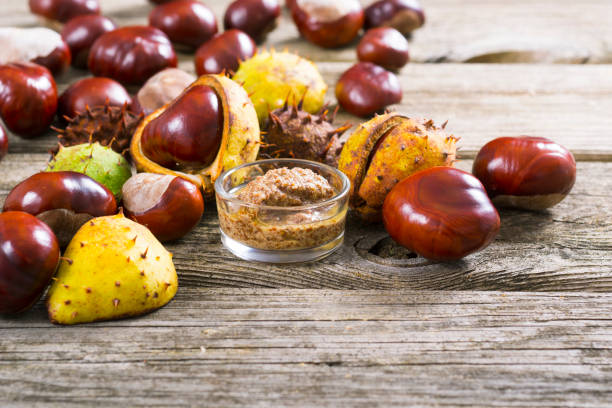
Besides seeking out treatment from a vascular physician, those with venous insufficiencies may also wonder what types of supplements and other natural remedies they can try in order to improve their venous health. They may tend to worry whether certain supplements are prescription or homeopathic. One new medication, horse chestnut, is a homeopathic way to boost your venous health—and it’s one that’s rarely talked about.
Horse chestnut seeds and leaves are packed with many impressive benefits for your veins. For example, It’s 600 times more powerful than a common vein treatment, Rutin, when fighting edema. Edema is also known as “blood pooling,” meaning the breakdown of vein valves that weaken circulation and cause blood to pool in the vein. The power of horse chestnut makes this an ideal medication to help treat varicose veins, chronic venous insufficiency, and leg swelling.
Varicose veins can form from poor blood flow, so any remedy that can improve circulation can also help symptoms. Horse chestnut improves blood flow within the veins by reducing the number and size of the pores within the capillary membrane. This restores the vein’s ability to contract properly and helps relieve the inflammation of the vein. This is also a simple remedy that can help strengthen the vein valves when trying to prevent varicose veins from forming. Horse Chestnut also contains the Key Ingredient Escin. Escin is one of the key reasons horse chestnut is a huge benefit for venous insufficiency, it counteracts inflammation in the capillaries. This helps to prevent vein valve deterioration and further lessen the symptoms of varicose veins.
When people are looking to fight signs of aging, they can turn to surgery or other, more dangerous procedures. Luckily, horse chestnut has anti-aging effects, making it a less dangerous way to slow down the everyday signs of aging. Skin, over time, loses its natural elasticity, which causes wrinkles and creases to develop, horse chestnut can slow this process by strengthening that elasticity. It does this by slowing the breakdown of hyaluronic acid, which helps to hold collagen fibers in place. It also counteracts free oxygen radicals that damage the skin. An additional benefit is that it helps to stabilize connective tissue and provide structural support in your skin. As you can see, if signs of aging are one of your concerns, horse chestnut can be a natural way to give your skin some extra support.
To understand how horse chestnut is a great choice for venous health, let’s look at what causes venous insufficiency. Your vein valves are constantly circulating blood throughout your body, but they aren’t perfect—sometimes they become weakened or damaged. When this happens, they struggle to circulate blood properly. The effects of this are worse in the leg because the veins have to push blood upward against the flow of gravity. Blood pools in the vein as a result and a varicose vein is created.
Horse chestnut works to fight everything that is an adverse effect of blood pooling. It has anti-inflammatory, antioxidant, and anti-edema properties. It gives additional support to veins, as well as protection for vessels and ducts. Now, let’s take a look at these benefits a little more in-depth.
Varicose veins come packaged with several symptoms that can cause unneeded pain and frustration. Blood pooling in the vein causes them to swell, and those with swollen, varicose veins can feel pain, tiredness, tension or heaviness in the leg. Horse chestnut’s anti-inflammatory properties help to address these symptoms so that you can go about your day-to-day activities feeling less pain in your legs.
Varicose veins, over time, can lead to bigger problems due to the lack of proper circulation. When blood pools in the vein, the vein can break down and ulcer. Because horse chestnut improves circulation, it can help slow down this ulceration process. Of course, it’s ideal to treat the varicose vein before it has the chance to ulcer—but horse chestnut can slow the process until you’re able to get treatment.
The lack of proper circulation can also lead to diminished oxygen supply within the vein. This creates a cascade of degeneration in the vein walls. Horse chestnut works to inhibit factors that break down the vein’s cell wall—which can lead to larger issues that will require more than a simple, natural varicose vein treatment.
Although venous insufficiency may not seem like a big problem at first, it can become one over time. Blood pooling in the vein can potentially lead to ulceration and blood clots, which take considerably more time and effort to treat—as well as being much more dangerous for your overall health. If you have venous issues, it’s important not to ignore them. A mixture of professional, specialized health care and medication can be an ideal way to treat both the symptoms and the causes of venous insufficiency. Best of all, treating an issue like varicose veins can be quick and easy with modern procedures and skilled, knowledgeable physicians.
If you want to learn how the combination of expert health care and new helpful medications like horse chestnut can impact your vein health, you don’t need to look far. The vascular physicians in Orlando at Central Florida Vein & Vascular Center are here to craft a treatment plan that will work best for you and your venous health. As a patient-centered private practice, we care about making sure you get the best possible treatment so that you can enjoy your life without heavy, painful legs due to venous insufficiency. You can contact us today to schedule a consultation with one of our specialists. And, if you want to want to learn about more ways to improve your venous health, you can also look through our blog for tips and information about treatment.